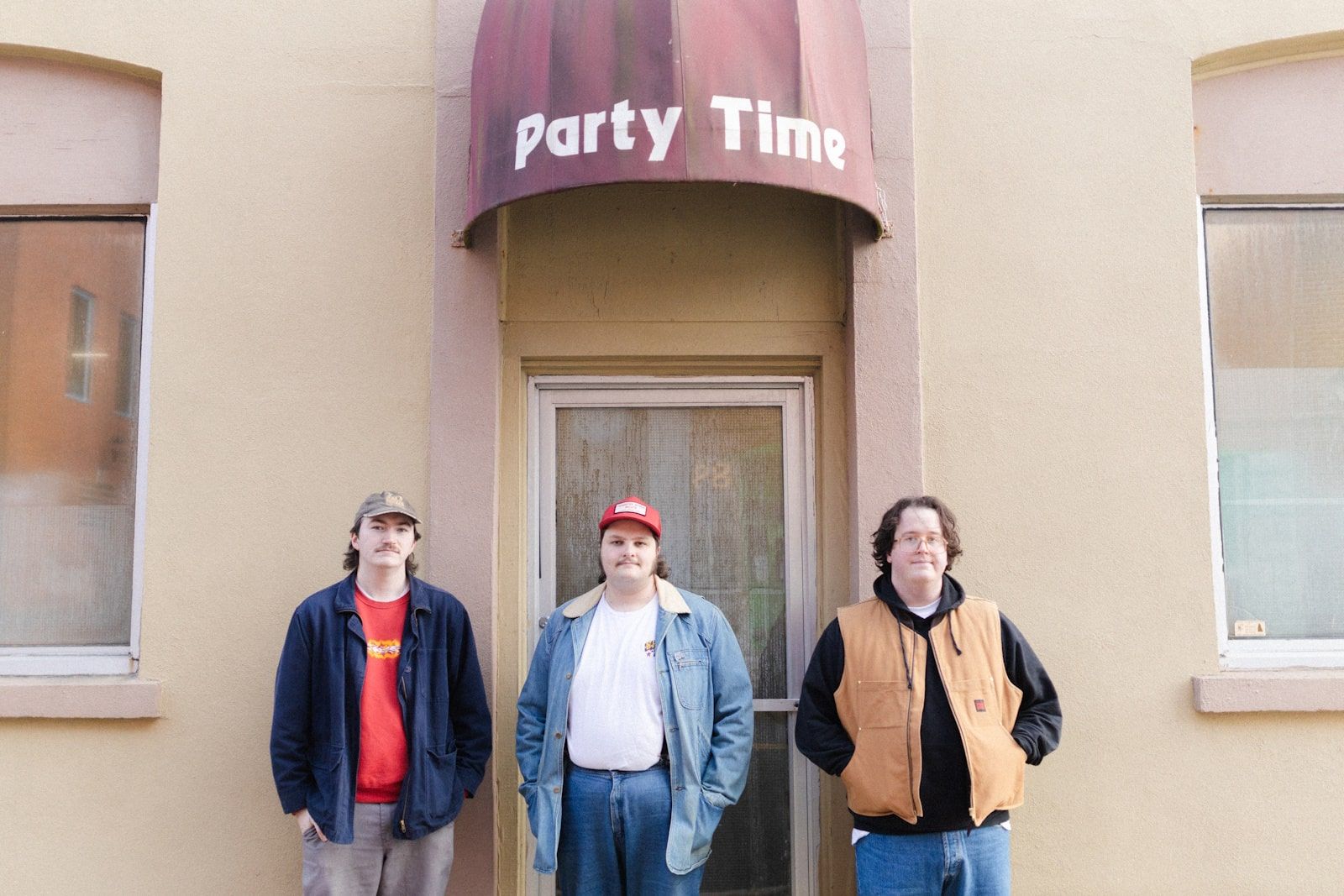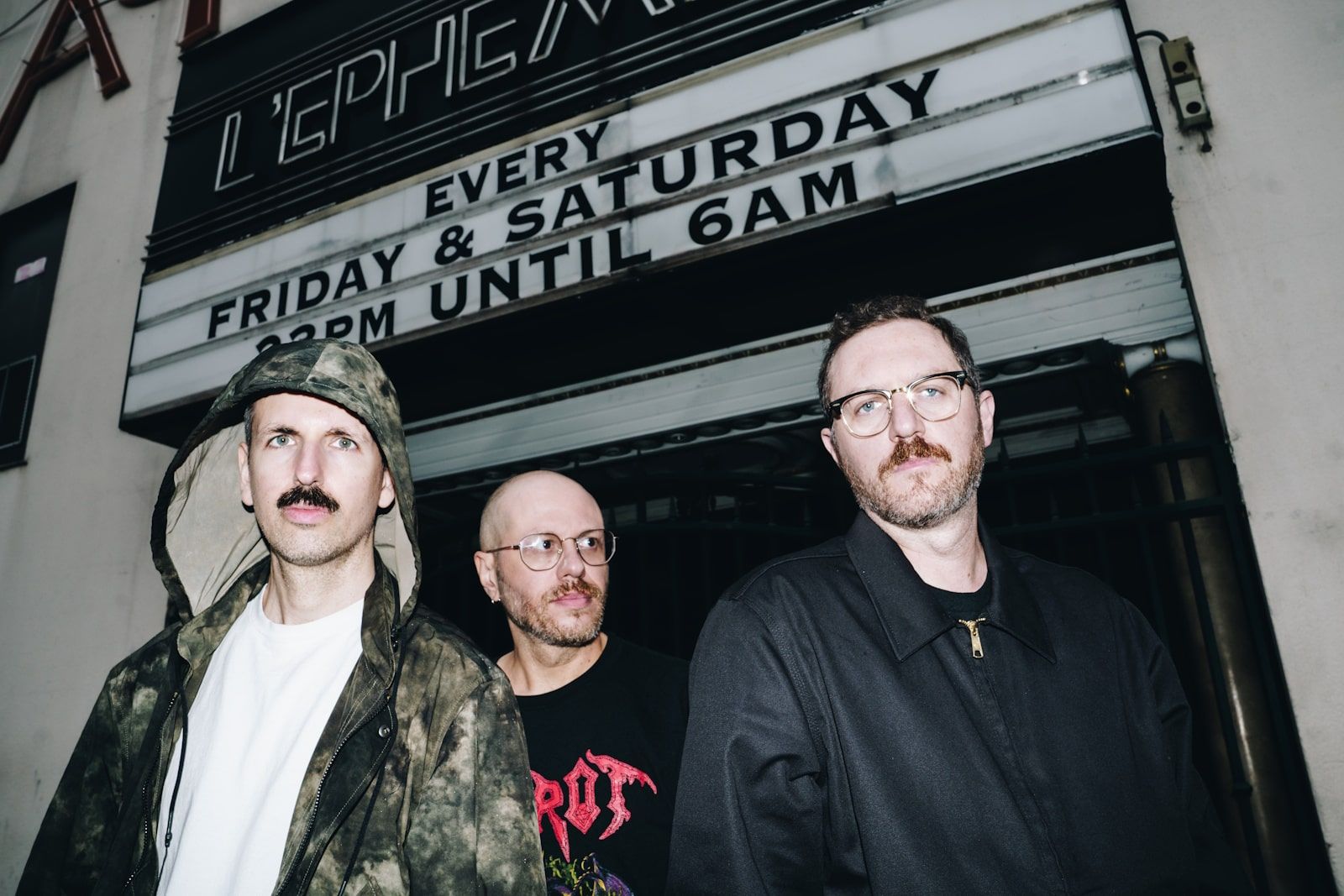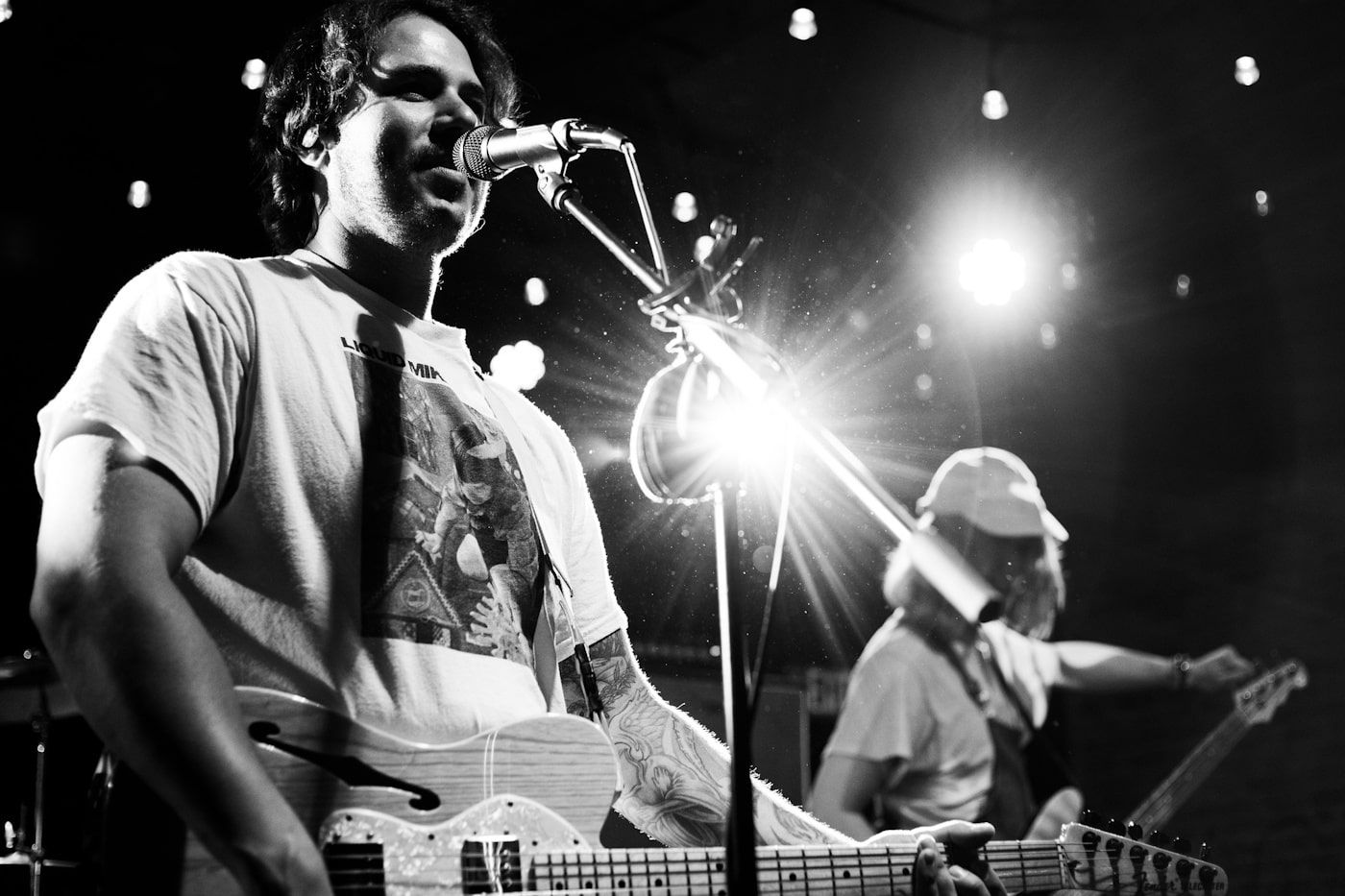Swimming’s second full-length, Old, isn’t just an album—it’s a document of time. A collection of songs conceived before their 2021 debut That’s OK, reworked and finally given proper form, Old feels like a band shaking dust off a set of memories and deciding which ones still hold weight.
What started as a way to clear out unfinished ideas evolved into something deeper—a raw, unfiltered look at the band’s early years, stitched together with the urgency of St. John’s basement shows and the quiet reflection of growing up.
“This is all some of our oldest music,” drummer and vocalist Jacob Cherwick says. “For one reason or another, these songs never fully found their footing until now. Some are pretty faithful to their original arrangements, others are completely reworked. We wanted this album to feel like a live show, stuffed into a sweaty basement with fifty people.”
That live-show intensity is preserved in every crackling transition, every unpolished burst of energy. The record took two years to complete, recorded by the band in Newfoundland, mixed by Dylan Hanwright (Great Grandpa, Gulfer), and mastered at Dead Air Studios by Will Killingsworth (Orchid, Jerome’s Dream). It’s coming out February 21 via No Funeral and Barely There Records, with vinyl and cassette runs handled by the respective labels.
View this post on Instagram
Thematically, Old lingers on the weight of nostalgia, burnout, and coming to terms with choices made along the way.
“Looking at the album as a whole, I think it really reflects the time in my life when most of these songs were written,” guitarist and vocalist Liam Ryan explains. “It’s a snapshot of that moment, and now it feels like a piece of me that I’ve left behind but can look back on.”
View this post on Instagram
Swimming doesn’t sugarcoat the past on Old—they dig through it, sit with it, reshape it. Some tracks remain almost untouched, others are reassembled with the hindsight of years gone by. What emerges is an album that doesn’t just capture a band’s early years but reflects on them with clarity. This is music from another time, but it still matters. For Swimming, the past isn’t something to run from—it’s something to finally set free.
Here’s the full track by track commentary for each song on the album:
Liam Ryan: guitar/vocals/co-producer; Jacob Cherwick: drums/vocals/co-producer
View this post on Instagram
JC: To give a bit of context, all of the songs on the album are some of our oldest (hence the title). These are all songs that, for one reason or another, never fully found their footing until now. Some of the songs are pretty faithful to their original arrangements, while others have been completely re-worked. The idea was to keep this album very raw and true to the sound of the live show. I wanted to give the listener the feeling that they’re stuff ed into a hot, sweaty basement in St. John’s on a cold night, with 50 of their friends listening to a rock band (specifi cally the rock band Swimming, lol).
LR: Looking at the album as a whole, I think it really refl ects the time in my life when most of these songs were written. The lyrics span a variety of experiences and emotions, but they’re all connected by themes that bridge one song to the next. It’s interesting to go through these lyrics track-by-track because it allows me to refl ect on what these songs meant. It’s a snapshot of my life at a particular moment, and now, it feels like a piece of me that I’ve left behind but can look back on.

You Smell Like Phys Ed
JC: For a long time, I think all of us would’ve considered this the best song we had written. Putting this song together in 2019 was when Swimming really honed in on our voice as a band. The song is more of an onslaught of hooks rather than a typical verse/chorus setup. I’ve always thought of this track as a very bombastic power-pop song, with sprinkles of the twinkly guitar work that we picked up from the 4th wave emo scene. We recorded a version of this song for a demo that we released in 2019 and always had the intention of revisiting it for an album, but when we started putting together our fi rst record That’s OK, this one didn’t feel like it was fi tting in.
Now we see it here kicking off the follow up record (of older music lol) and I think it’s a good introduction to this batch of songs.
LR: “You Smell Like Phys Ed” was written during an earlier chapter of my adult life, when I was fi rst becoming fi nancially independent and earning some income through music. At that time, the idea of making money from music seemed like an unattainable dream. The gigs I had weren’t focused on my original music—they were mostly as a hired session musician, playing bass or guitar. The song refl ects my stress over a hectic schedule and lifestyle, while feeling embarrassed by the fact that I was playing music for money. I feared my peers were looking down on me, and I was insecure about the gigs I was taking.
The song ends by summarizing a conversation I had with a close friend I hadn’t seen in a while. We caught up, and I found myself questioning what we still had in common. While my life felt chaotic, my friend was focused on his past, trying to appear confi dent while also struggling with his own insecurities. In my mind, our experiences mirrored each other, just expressed in diff erent ways.
Rat
JC: This was a quick song that Liam had lying around in parts. We decided to fi nish it up for an early Swimming gig and played it several times. Eventually it disappeared from the setlist and got pushed to the back burner. Musically I think it’s a bridge between the pop punk infl uenced stuff we were doing at the very beginning of the band and the more experimental approach we were taking around our fi rst LP. We re-worked the lyrics for the fi nal version, but otherwise this one is just as lean & mean as when we fi rst put it together.
LR: Rat tells a straightforward story about an incident where I got punched in the face in the middle of playing a show. I was out in the crowd during a section of the set when someone randomly punched me. I’m guessing they were drunk and had a loose understanding of what a mosh pit was (or maybe not). By the end of the song, I talk about coming to terms with the fact that I was probably a dumbass for even being in the crowd to begin with.
Reports
JC: Reports is the oldest song on the record. It predates Swimming, going back to when Liam & I were in college playing a lot of indie rock. The original version of the song was a lot longer with big extended instrumental sections. Years after we started Swimming, we re-discovered an old demo and realized we still liked the main melody & chord structure, so we re-worked it, approaching it as more of a fuzzed out rock song and ending up with a song that was pretty close to the fi nal version. We added the big noisy bridge when we were in the studio and I think that really tied the whole thing together. It’s a fun song to play.
LR: About 80% of the songs on this album had their lyrics touched up, some more drastically than others. The melody for Reports has largely stayed the same, but the lyrics evolved signifi cantly over time. The lyrics went through many drafts, but eventually became about mental fatigue—feeling fed up with what people expect from you while you’re already struggling with your own life. It’s about burning out and trying to fi gure out what will make you happy amidst all the pressure.
Basement
JC: Musically, this is probably the simplest song on the record. I kinda like it for that reason though, it kinda feels like an early Weezer song, but a little more weird and off -kilter.
LR: Basement is about refl ecting on a lifelong friendship and the drifting apart that happens as life moves on. We associate physical spaces with relationships, friend groups, and activities, and over time, those spaces change—sometimes physically, like renovations or moving furniture, and sometimes in a deeper sense, as the relationships themselves evolve. In my case, I had a close friend I used to jam with in the basement from middle school through college. Over time, we grew apart, developing diff erent interests.
Though I still have love for him, the basement at my parents’ house went from being a place where we created music together to something I no longer recognized or connected with.
CDE
JC: We originally tried recording this song for our fi rst EP in 2018. While we were in the studio laying down the bed tracks, our bass player Nick (who was very new to the band at the time) kept getting tripped up on part of the songs that transitions from C to D to E, to the point that we never got a usable take. We jokingly kept referring to the song as “CDE” after that, and the name stuck. Luckily, I think not recording it for that EP was a blessing in disguise cause the arrangement & lyrics are way better now than they were back then.
LR: “CDE” is another song that went through several lyrical revisions. It’s about relationships that have run their course, specifi cally people you used to be friends with but no longer want to associate with, for various reasons. Some of these relationships have been over for a long time, but hearing certain news just solidifi es it in your mind: it’s really over.
Nothing
JC: This one also sat next to ‘You Smell Like Phys Ed’ on the bandcamp demo we put out in 2019. It was called ‘Nothing to No One’ at that point and it actually did a good deal for us in terms of fi nding an audience online. That demo got posted on YouTube by someone who catalogues Emo music and got a bit of a buzz going around our name in the scene. I think it’s a good example of our formula as a band, starting with some math-rock inspired noodly riff s, and then settles into a more straight ahead power pop song, only to swerve back into a very maximalist instrumental section. We’ve played this song at almost every gig we’ve ever played, it’s good to have it fi nally being released offi cially.
LR: This may be the shortest song, lyrically speaking. It’s pretty straightforward in meaning. I was mostly venting about a lifetime of being cut off in conversation and not really being concerned about fi nishing what you had to say in the fi rst place. Perhaps a bit petty, but I think I was pretty frustrated when I wrote it.
Short
JC: This one actually started as an instrumental thing that we would play at the beginning of sets in the early days. It originally had this sort of extended intro that had a weird jazzy-muzak vibe and then would cut in the song as it is here. We felt that didn’t really make sense anymore in the context of what we’re doing now, so we re-worked it as a short track that’s inspired by the more screamo-adjacent midwest emo bands. You can still pick up on some remnants of jazz fusion in there if you listen closely lol.
LR: The lyrics on ‘Short’ try to capture that feeling of being in a large crowd where the sound of everyone talking becomes this overwhelming noise, making it impossible to distinguish individual voices. It’s about that sense of disconnect when everything around you feels like just noise.
Glimpse
JC: This one is a solo track that Liam does by himself, so I’ll let him explain it.
LR: ‘Glimpse’ was a later addition to the album. It’s a new song, not from the past like the others. Its lyrics touch on the theme of time passing by at an alarming rate. As you grow older, time seems to slip away quickly. When you’re young, life feels bookended by milestones like the start of school or winter break. But as an adult, you’re juggling responsibilities, and years can pass in a fl ash.
The song starts with memories of watching cars from my bedroom window as a kid, wondering which one belonged to my parents when they were out late. Then, it shifts to memories of being woken up on Saturday mornings by the sound of the front door closing as my family left to run errands. Finally, the song moves to the present day, refl ecting on the passing of time. It was inspired by the song Gone Things by Knola, which resonated with me deeply, as I found myself living through similar experiences.
Charlie
JC: A big one to fi nish the record off . There’s a bit of a rock opera vibe going on here (that’s a bad way of describing it lol). I feel like ‘Charlie’ is almost a chronological journey through our development as a band, starting off as a very early-2000s style pop punk song, slowly incorporating some more experimental rhythms, then breaking down into more atmospheric sections.
The final act of the song is a long bridge that builds over a repeating guitar motif, eventually building into a very cathartic noise solo that was comprised of 6 separately tracked guitar solos layered on top of each other (I still feel bad for our mixing engineer Dylan when I hear this one lol). This is also the only time on this album that we ventured outside of the regular instrumentation of the band, bringing my dad on accordion and my sister on the violin. It always feels special to bring in these people that I’ve been playing music with my whole life and I’m happy we found a spot for it.
LR: It’s fi tting that ‘Charlie’ is the last song, as it sums up many of the themes of the album. It’s about the anxiety of getting older and clashing with people who don’t understand your life choices—people whose opinions start to stress you out.
The song ends with the idea that you have to “sleep in the bed you make.” If you’re stressed and confl icted, it aff ects your life, and there’s no easy way to just turn it off . You have to learn how to handle it and move forward. I don’t mean to sound overly self-helpish, but how you cope with these feelings is personal—there’s no one-size-fi ts-all solution. The important thing is to keep going because, eventually, things do get better.









